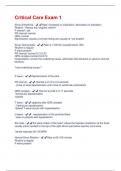Critical Care Exam 1
Sinus Arrhythmia - ✔️✔️Rate: increases on inspiration, decreases on expiration
Rhythm: *Always has irregular rhythm*
P waves?: yes
PR interval: normal
QRS: normal
Significance: usually a normal finding and usually is *not treated*
Sinus Tachycardia - ✔️✔️Rate is >100/min (usually below 160)
Rhythm is regular
P wave present
PR interval: normal 0.12-0.20
QRS complex:normal 0.6-0.10
Interpretation: correct the underlying cause, adminster beta blockers or calcium channel
blockers.
*treat underlying cause.**
P wave - ✔️✔️Depolarization of the atria
PR interval - ✔️✔️-Normal is 0.12 to 0.2 seconds
- onset of atrial depolarization until onset of ventricular polarization
QRS complex - ✔️✔️-Normal is 0.06 to 0.11 seconds
-Ventricular depolarization
-systole
T wave - ✔️✔️-appears after QRS complex
- Ventricular repolarization
-Spiked T-wave occurs with hyperkalemia
U wave - ✔️✔️- repolarization of the purkinje fibers
- seen in patients with hypokalemia
SA node - ✔️✔️the pace-maker of the heart; where the impulse conduction of the heart
usually starts; located in the top of the right atrium just below superior vena cava
*sends impulses 60-100 BPM
Normal Sinus Rhythm - ✔️✔️Rate is 60-100/ minute
Rhythm is regular
P wave present
,PR interval: normal 0.12-0.20
QRS complex:normal
Interpretation: normal sinus rhythm
normal QRS: 0.06- 0.10
Sinus Bradycardia - ✔️✔️Rate is <60/minute
Rhythm is regular
P wave present
PR interval: normal 0.12-0.20
QRS complex:normal
Interpretation: treat sinus brady with *0.5mg atropine ( if emergent)* , dopamine,
epinephrine, pacer.
*normal in patients when sleeping or sleeping
-may occur with use of Beta blockers or calcium channel blockers, digoxin, morphine,
vagal stimulation, hypothermia, hypothroidism
- may be a normal response from a fever, exercise, anxiety, pain, dehydration. May
accompany shock, LHF, hyperthyroidism, anemia, hypovolemia, PE, MI
-can be caused by caffiene, nicotine, amphetemines, atropine, cocaine.
Premature Atrial Complexes - ✔️✔️Rate: normal
Rhythm:abnormal
P waves?: Yes, has *EARLY* p waves
PR interval? WNL
QRS:WNL
Significance:
*electrical impulses start in atrium BEFORE beat finishes
-CAUSES: stimulants, alcohol, anxiety, hypokalemia
-common in normal hearts*
- if EKG shows many, could be an early sign of SVT or A.fib
TREAT underlying cause (minimize stress, dont drink caffeine)
Atrial Flutter - ✔️✔️Rate: 250-400/min
Rhythm: regular
P waves: NO only flutter(sawtooth) waves are seen
PR interval: N/A
QRS: WNL
Significance:
, SAWTOOTH waves
*if ventricles try to catch up, can be a bad tachycardia
*Patient can live fine with A. flutter, just control rate
-CAUSES- pulmonary disease (COPD,OSA, Pulm. HTN), heart valve disease, after
open heart surgery
TREAT: CARDIZEM anticoagulants, perdoxa, dysrhythmic, amiodarone,BB, Digoxin,
Cardioversion (if hemodynamically unstable and tachy)
Atrial Fibrillation - ✔️✔️*most common adult arrhythmia
Rate: >400 *can be normal*
Rhythm: irregular
P waves: No P waves
PR interval: N/A
QRS: normal
Significance:
becomes dangerous when ventricles try to catch up
A.fib can be baseline and controlled if hr <100
-CAUSES- pulm. disease, increased age, males, overweight, chronic HTN, HF, open
heart surgery
-TREAT- Digoxin (to put into NSR), cardizem, amiodarone, corvert, cardioversion
What is the same for NSR, SB, ST? - ✔️✔️*all have a P wave.
* all have a normal PR interval.
*all have a normal QRS interval.
*All start at SA node.
***only difference is change in RATE**
Atrial Kick - ✔️✔️Atrial kick is a term that represents the amount of the total CO that is
supplied via atrial contraction.
Pulse pressure - ✔️✔️Systolic # - Diastolic # = pulse pressure
What should you assess in a patient with dysrhythmia? - ✔️✔️LOC
rate and rhythm of apical and peripheral pulses
heart sounds
blood pressure
pulse pressure
signs of fluid retention
health history
Cardizem - ✔️✔️-Trade name for Diltiazem, Calcium Channel Blocker, Vasodilator
*first line treatment for A.flutter/ A.fib *




